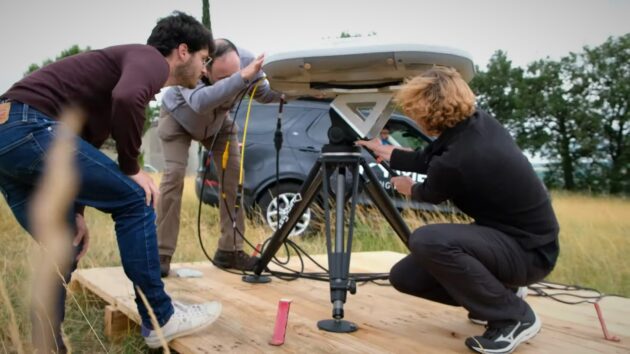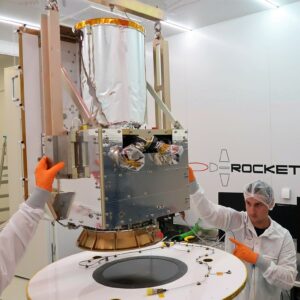
Redmond, Wash.-based Kymeta Corp., the mobile connectivity company backed by Bill Gates, has signed a distribution partner agreement with OneWeb to offer satellite broadband services around the globe.
The agreement clears the way for Kymeta to resell OneWeb services in conjunction with fixed-site and mobile hardware solutions to government and commercial customers globally.
Today’s announcement comes as Kymeta sharpens its focus on commercial, government and military customers — and as OneWeb copes with challenges related to Russia’s invasion of Ukraine.
Just three months ago, the two companies agreed to adapt Kymeta’s u8 flat-panel antenna system to support communications with OneWeb’s satellite constellation in low Earth orbit, or LEO, with an eye toward bringing the system to market by the end of this year.
But that was before Russian forces invaded Ukraine, setting off a cascade of economic sanctions and broken business ties. Russia’s Soyuz rockets, which have launched all 428 of the OneWeb satellites currently in orbit, are no longer an option. This month, Russia canceled a scheduled launch and seized 36 of OneWeb’s satellites when the venture refused to change its British-Indian ownership structure and guarantee that the satellites wouldn’t be used for military purposes.
This week, OneWeb announced a deal to have future satellites launched on SpaceX’s rockets. That deal is unusual, because OneWeb’s broadband service is arguably a competitor for SpaceX’s Starlink service. Starlink is already available in selected markets — including Ukraine — while OneWeb hasn’t yet begun service.
In today’s announcement, Kymeta and OneWeb talked up the promise of satellite-based mobile connectivity.
“Whether connectivity is needed on land, at sea or in the air, Kymeta continues to deliver through innovation and strong partner relationships,” said Walter Berger, Kymeta’s president and co-CEO. “Our distinctive technology can switch between linear and circular polarization in software, allowing support for both LEO and GEO Ku-band constellations without any physical changes to the hardware required.”
OneWeb CEO Neil Masterson said the agreement with Kymeta is “another example of OneWeb’s dedication to enabling resilient and secure connectivity for all with fast, high-bandwidth and low-latency communications services that enhances lives and can be accessed through revolutionary technology like Kymeta’s flat-panel u8.”
The new Kymeta service will offer stand-alone OneWeb satellite connectivity, or a package that also includes connectivity from geostationary satellites. That would be particularly attractive to military users looking for access to a multi-constellation platform while on the move.
Last week, Kymeta said it closed on an $84 million funding round led by Bill Gates, aimed at accelerating the production of its flat-panel antennas and expanding its offerings for military customers as well as LEO satellite broadband users. In today’s announcement, Berger emphasized the defense-related applications.
“Kymeta’s expansion into managed satellite services allows us to package our hardware solutions as a service, a capability the U.S. DoD [Department of Defense] and other users are increasingly seeking,” he said.
Kymeta has also announced new product branding to sharpen the focus on its three target markets. Its commercial connectivity terminal will be known as the Hawk u8, the terminal for government applications will be the Goshawk u8, and the terminal for military applications will be the Osprey u8.
That emphasis on commercial, government and military customers — as opposed to individual consumers — meshes with OneWeb’s current market strategy.
Update for 12:10 p.m. PT March 22: OneWeb also has announced a partnership with Eutelsat to provide LEO connectivity services; with Speedcast for service distribution; and with Telstra to make use of gateway services at teleports across Australia,





